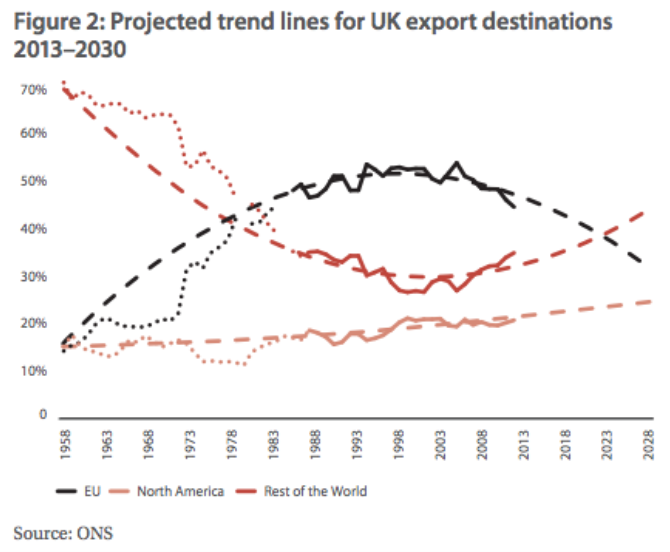![[Click for full screen]](https://www.stevebaker.info/wp-content/uploads/2016/06/Postcards-03.png)
Today, we trade more with countries outside the EU (56 percent) than within (44 percent). The UK has a trade surplus of £31 billion with non-EU countries per year, but a deficit of £67.8 billion with the EU. See the relevant Commons Library brief for more.
In some cases, we do more trade with countries without a trade deal than we do with the EU. As Richard Tice told the Treasury Select Committee:
We should remember we do not have to have a free trade agreement in order to very successfully trade with another country. For example, we have a greater trade surplus in services with the United States of 350 million people, with whom we do not have a free trade agreement, than we have with the EU of 500 million people. You do not need trade agreements in order to very successfully trade with other countries.
Alarmingly, Europe is second only to Antarctica for low economic growth, with just a 3 percent increase in economic output since 2008. A major reason is the outdated customs union model of the EU, which was established before the fall of the Soviet Union, the internet revolution and inexpensive air travel.
If we remain locked inside this protectionist zone, we will have one foot left in the mid-Twentieth Century and remain at risk of falling behind the global economy of the future.
Business for Britain’s Change or Go report projects trend lines for UK export destinations to 2030:
The state of the economy is a key issue which drives people to the polling station during General Elections but, as a member of the EU, we lose considerable power to shape our own destiny. We are compelled to rely on the EU to negotiate trade deals on our behalf and on behalf of 27 other countries, often with conflicting interests.
The EU is not good at it. As my colleague David Davis MP has pointed out in a speech:
Negotiations to reach a trade deal between the EU and Singapore, for example, lasted nearly six years.
It took nine years to come up with a free trade deal with Canada – which may well founder after Romania indicated they may exercise their veto in a row over visas.
The negotiations between the EU bloc and India went on so long they gave up.
The EU, can you believe this, does not have trade agreements with China, or India, or Russia or the US.
The reality is that the EU’s track record on trade is very poor.
In contrast:
For example, look at Chile, which has a third of our population and a tenth of our economy.
Chile has managed to get trade deals with the biggest economies around the world, including the US, China, India, Japan, Australia, Canada and South Korea.
The EU has trade deals with economies which have a total GDP of just £4.7 trillion. Chile has trade deals with £40 trillion-worth of countries. Almost ten times more.
Not only has Chile got these deals, it has negotiated most of them a hell of a lot faster than the EU.
It took Chile, without all the supposed influence of being a member of the EU, just 10 months to negotiate a deal with China. 10 months.
They took just 9 months to negotiate a deal with Australia, 10 with Canada, 12 months with Japan and 24 months with the US.
Can the Remain campaign seriously continue to argue that we would not be able to open up new trade opportunities if we voted to Leave?
And before Remain do their normal banal trick when faced with hard facts, and try to claim that we are now going for the “Chilean model”, it isn’t just Chile.
Singapore, Switzerland and South Korea, negotiating their own trade deals and without the so-called ‘clout’ of the EU, each have FTAs with over £27 trillion-worth of countries.
They also negotiate their deals far faster than the EU does.
And 90% of their trade deals include services, critical to the British economy, as opposed to only 2 out of 3 of EU deals.
The UK isn’t the only victim of the EU’s ageing customs union. Using tariffs, the EU freezes out countries in developing regions, most notably Africa. In a speech, my colleague James Cleverly MP – whose mother is from Sierra Leone – explained “How the EU’s Common Agricultural Policy is making African farmers poorer“. We can do better.
Outside the EU, we regain our seat at the World Trade Organisation and our freedom to arrange trade deals with the world as a strong and independent trading voice.
For the change we need, vote to Leave on 23 June.
